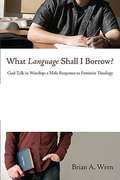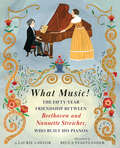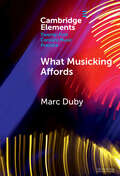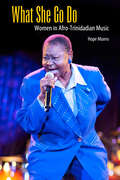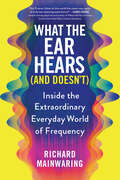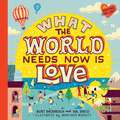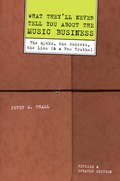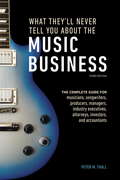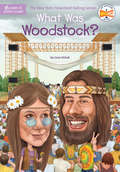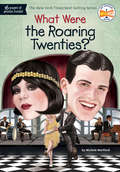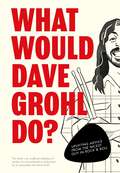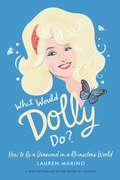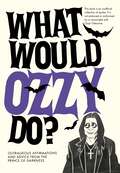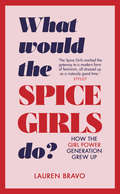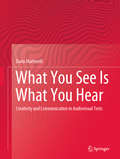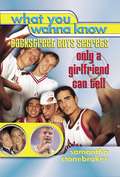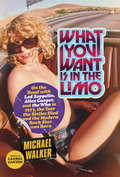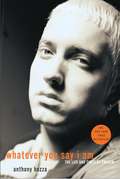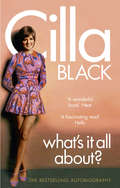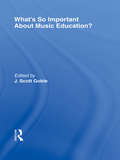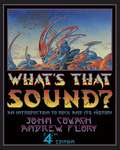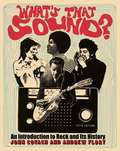- Table View
- List View
What Language Shall I Borrow?: A Male Response to Feminist Theology
by Brian A. WrenThe author of this book writes from the experience of being English, white, male, and heterosexual, and as one who values the Reformed tradition and has been shaped and enriched by it.
What Music!: The Fifty-year Friendship between Beethoven and Nannette Streicher, Who Built His Pianos
by Laurie LawlorStrings quivered. Notes shimmered. Meet best friends acclaimed composer Ludwig van Beethoven and bold female entrepreneur Nannette Streicher in this lively and lyrical nonfiction picture book.In a tall, narrow building on a wide avenue pianos plinked and plunked day and night.Everyone in quiet Augsburg knew the Stein home.What music!In 1787, aspiring yet unknown composer Ludwig van Beethoven arrives at young Nannette Stein&’s home. What follows is a decades-long friendship that persists whether life hits a low or high note. Acclaimed nonfiction writer Laurie Lawlor deftly depicts how these two fascinating friends—a composer with hearing loss and a woman who became an innovative piano maker in a time that discouraged female entrepreneurship—fought the odds and worked together in perfect harmony. The author of picture book biography Fearless World Traveler, Lawlor masterfully uses forgotten historical letters, a glossary, and rich back matter on both friends&’ lives and art to introduce readers to the man behind the music, from his loud laughter to his crushing handshake. Complete with Fearless World Traveler collaborator Becca Stadtlander&’s intricate mixed-media artwork, What Music deftly dives into musical history–and herstory–in an intimate yet expansive picture book biography that hits just the right note.
What Musicking Affords: Musical Performance and the Post-cognitivist Turn (Elements in Twenty-First Century Music Practice)
by Marc DubyThe last three decades of work in cognitive science have challenged the idea that thinking occurs entirely in the head, claiming instead that cognition is embodied, embedded, extended, and enactive. The claims of 4E cognition challenge the dominance of computational approaches to cognition, and music scholars have explored Gibson's notion of affordances to propose a new understanding of musical performance as primarily grounded in action. This Element draws from paradigms such as enactive cognition, cybernetic and systems-theoretical approaches, phenomenological perspectives on practice, Gibson's theory of affordances, and aspects of the author's own practice as a multi-instrumentalist to consider cases of how the interface between musician and instrument influences performance.
What She Go Do: Women in Afro-Trinidadian Music (Caribbean Studies Series)
by Hope MunroIn the 1990s, expressive culture in the Caribbean was becoming noticeably more feminine. At the annual Carnival of Trinidad and Tobago, thousands of female masqueraders dominated the street festival on Carnival Monday and Tuesday. Women had become significant contributors to the performance of calypso and soca, as well as the musical development of the steel pan art form. Drawing upon ethnographic fieldwork conducted by the author in Trinidad and Tobago, What She Go Do demonstrates how the increased access and agency of women through folk and popular musical expressions has improved intergender relations and representation of gender in this nation. This is the first study to integrate all of the popular music expressions associated with Carnival—calypso, soca, and steelband music—within a single volume. The book includes interviews with popular musicians and detailed observation of musical performances, rehearsals, and recording sessions, as well as analysis of reception and use of popular music through informal exchanges with audiences. The popular music of the Caribbean contains elaborate forms of social commentary that allows singers to address various sociopolitical problems, including those that directly affect the lives of women. In general, the cultural environment of Trinidad and Tobago has made women more visible and audible than any previous time in its history. This book examines how these circumstances came to be and what it means for the future development of music in the region.
What the Ear Hears (And Doesn't): Inside the Extraordinary Everyday World of Frequency
by Richard Mainwaring"You'll never listen to the world the same way again. A truly ear-opening experience!" —Chris Ferrie, award-winning physicist and author of Where Did the Universe Come From? And Other Cosmic QuestionsFor readers of Neil deGrasse Tyson and Bill O'Neill, What the Ear Hears (and Doesn't) is a fascinating science book for adults that explores the physics principle of frequency and the (sometimes weird) role it plays in our everyday lives.What do the world's loneliest whale, a black hole, and twenty-three people doing Tae Bo all have in common?In 2011, a skyscraper in South Korea began to shake uncontrollably without warning and was immediately evacuated. Was it an earthquake? An attack? No one seemed quite sure. The actual cause emerged later and is utterly fascinating: Twenty-three middle-aged folks were having a Tae Bo fitness class in the office gym on the twelfth floor. Their beats had inadvertently matched the building's natural frequency, and this coincidence—harnessing a basic principle of physics—caused the building to shake at an alarming rate for ten minutes. Frequency is all around us, but little understood.Musician, composer, TV presenter, and educator Richard Mainwaring uses the concept of the Infinite Piano to reveal the extraordinary world of frequency in a multitude of arenas—from medicine to religion to the environment to the paranormal—through the universality of music and a range of memorable human (and animal) stories laced with dry humor. Whether you're science curious, musically inclined, or just want to know what a Szechuan pepper has to do with physics, What the Ear Hears (and Doesn't) is an immensely enjoyable read filled with "did you know?" trivia you'll love to share with friends.
What the World Needs Now Is Love
by Burt Bacharach Hal DavidFor anyone who needs to be reminded of the power of love, this beautiful book is the perfect gift!With its soothing lyrics and calming tones, "What the World Needs Now Is Love" has become a beloved song worldwide since its release in 1965. Now, for the first time ever, these captivating lyrics are in book form accompanied by gorgeous illustrations, and perfectly packaged with a ribbon enclosure.Both a reminder of the importance of love and a call to make the world a better place, this book is the perfect gift for anyone you care about—or for yourself when you need some gentle comfort.
What They'll Never Tell you About the Music Business: The Myths, the Secrets, the Lies (& a Few Truths)
by Peter M. ThallThis insider guide discloses the hidden dynamics and often unfortunate consequences of what really happens when a deal is prepared, contracts are signed, and promises are made--and alerts musicians, attorneys, songwriters, and anyone else interested in the music business to the potent dangers lurking beneath the surface of this incredibly competitive industry.
What They'll Never Tell You About the Music Business, Third Edition: The Complete Guide for Musicians, Songwriters, Producers, Managers, Industry Executives, Attorneys, Investors, and Accountants
by Peter M. ThallThe completely revised and expanded edition of What They'll Never Tell You About the Music Business is a must-have reference. You'll learn:- How many musicians have seized do-it-yourself internet opportunities to create successful business models, - How the royalty pie is sliced--and who gets the pieces, - How the fundamentals of music publishing, producing, managing, touring, and the record industry apply more than ever, - Why this book is the indispensable guide to the worldwide music industry, - How corporate general counsels can educate their employees (and themselves) to understand the strictures of copyright law and to avoid trouble, - And much more.From the Trade Paperback edition.
What to Listen For in Music
by Aaron CoplandCalled the definitive guide to musical enjoyment ("Forum"), this classic work is the only book of its kind written by an eminent American composer. With his provocative suggestions, Copland guides readers through a deeper appreciation of the most rewarding of all art forms. Revised reissue.
What Was Woodstock? (What Was?)
by Joan Holub Kevin Mcveigh Gregory CopelandOn August 15, 1969, a music festival called "Woodstock" transformed one small dairy farm in upstate New York into a gathering place for over 400,000 young music fans. Concert-goers, called "hippies," traveled from all over the country to see their favorite musicians perform. Famous artists like The Grateful Dead played day and night in a celebration of peace, love, and happiness. Although Woodstock lasted only three days, the spirit of the festival has defined a generation and become a symbol of the "hippie life."
What We Really Do: The Tallis Scholars
by Peter PhillipsThe founder and conductor of this amazing, Renaissance a cappella choral group describes the founding and history of the group and what it's like for singers to travel. Includes complete list of all performers and recordings. Also, discussed is the technical organization of the group, their singing techniques and rehearsal techniques.
What Were the Roaring Twenties? (What Was?)
by Michele Mortlock Who Hq Jake MurrayFlappers, flag-pole sitting, and the Ford Model T--these are just a few of the things that instantly conjure up a unique era--the Roaring Twenties.It was the bees' knees, the cat's meow. If you're not familiar with 1920s slang, all the more reason to read this fascinating look at that wild, exciting decade. It began on the heels of one tragedy--the flu pandemic of 1918--and ended with another: the start of the Great Depression. But in between there were plenty of good times--the Model T cars that Henry Ford made were cheap enough for the masses, the new sound of jazz heated up speakeasies and nightclubs during the time of Prohibition. Women, recently given the right to vote, cut their long hair into bobs, wore short skirts and makeup, and danced the Charleston (sometimes in marathons that lasted days). Michele Mortlock hits all the highlights of this heady age that still feels modern even a hundred years later.
What Would Dave Grohl Do?: Uplifting advice from the nicest guy in rock & roll
by Pop Press‘I love being the guy headlining rock festivals with grey hair and wrinkles.’Besides being the Foo Fighters’ frontman and the drummer in Nirvana, Dave Grohl is perhaps best known as the nicest guy in rock and roll.From rocking out with musical heroes like Kurt Cobain and Paul McCartney to selling out the biggest arenas on the planet despite performing with a broken leg, Dave approaches everything he does with passion and infectious energy.In ‘Times Like These’ we can all rely on Dave Grohl to remind us of the power of friendship, creativity and good, old-fashioned rock and roll.
What Would Dolly Do?: How to Be a Diamond in a Rhinestone World
by Lauren MarinoA spirited homage to Dolly Parton that captures the unique humor, no-nonsense wisdom, flash, and sass of one of America's most iconic stars.One of twelve children raised in a shack in the foothills of the Appalachian Mountains, Dolly Parton grew to become an international superstar famous for classic songs such as "Jolene," "9 to 5," "The Coat of Many Colors," and "I Will Always Love You." She is a reflection of the American dream, a role model for the ages, and a mentor to a whole new generation of entertainers. There is much to be learned from her unique brand, her big heart and spirituality, her grit and work ethic.This lively, illustrated book--part biography, part inspiration, part words of wisdom and life lessons--highlights the very best of the "Dolly Mama," from her quotable Dollyisms, unrelenting positivity, and powerful spirituality, to her belief in the human ability to overcome adversity. Drawing on Dolly's two autobiographies, cookbooks and songs; as well as artifacts; books by her family members; biographies; and decades worth of television, print interviews and performances, What Would Dolly Do? shows you how to tap into your Inner Dolly with confidence, faith, and humor.
What Would Ozzy Do?: Outrageous affirmations and advice from the prince of darkness
by Pop Press'The taste of bats is very salty.'Godfather of heavy metal, star of the iconic and record-breaking MTV reality show and Birmingham's favourite son, Ozzy Osbourne is the master of embracing every reality.As a multi-platinum record holder and loving family man with survival in his very DNA, Ozzy has plenty of wit and humble wisdom to share.Get on board the crazy train and get inspired with compelling insights on family, friends, music, philosophy and more from one of the most pioneering musicians of all time.
What Would the Spice Girls Do?: How the Girl Power Generation Grew Up
by Lauren BravoThe perfect gift for the Spice Girls fan in your life!‘Lauren Bravo is one of my very favourite writers.’ Dolly Alderton'A joyous and energetic celebration of girlhood, friendship and pop culture. If you have ever sung into the lid of a can of Impulse body spray, you need to read this.' Daisy BuchananThe words 'girl power' conjure vivid memories of short skirts and platform boots. But it wasn't just about the look, it was about feminism. The Spice Girls gave a generation their first glimpse of the power of friendship, of staying true to yourself, of sheer bloody-mindedness. And the girl power generation went on to kick-start a new conversation around gender equality.We may have grown up asking What Would the Spice Girls Do?, but their particular brand of feminism is as relevant today as it was twenty years ago – we still need that fun and fearlessness, we still need accessible and all-embracing equality… we still need a zig-a-zig-ah.‘The Spice Girls’ arrival on the pop scene marked the gateway to a modern form of feminism, all dressed up as a riotously good time.’ StylistAs featured in Elle magazine's Best Feminist Gift Books
What You See Is What You Hear: Creativity and Communication in Audiovisual Texts
by Dario MartinelliWhat You See Is What You Hear develops a unique model of analysis that helps students and advanced scholars alike to look at audiovisual texts from a fresh perspective. Adopting an engaging writing style, the author draws an accessible picture of the field, offering several analytical tools, historical background, and numerous case studies. Divided into five main sections, the monograph covers problems of definitions, history, and most of all analysis. The first part raises the main problems related to audiovisuality, including taxonomical and historical questions. The second part provides the bases for the understanding of audiovisual creative communication as a whole, introducing a novel theoretical model for its analysis. The next three part focus elaborate on the model in all its constituents and with plenty of case studies taken from the field of cinema, TV, music videos, advertising and other forms of audiovisuality. Methodologically, the book is informed by different paradigms of film and media studies, multimodality studies, structuralism, narratology, “auteur theory” in the broad sense, communication studies, semiotics, and the so-called “Numanities.” What You See Is What You Hear enables readers to better understand how to analyze the structure and content of diverse audiovisual texts, to discuss their different idioms, and to approach them with curiosity and critical spirit.
What You Wanna Know
by Samantha StonebrakerYou know him as B-Rok, a front man for the Backstreet Boys. I know him as G.B., a special nickname shared only between the two of us until Now. I am Brian Littrell's first love and highschool sweetheart. Brian and I were best friends for four years. I was with the Backstreet Boys from the beginning when they were just about to catch their shooting star. From signing their record deal to touring across Europe, Brian and I were inseparable. I saw the ups and downs, and want to share this amazing story with you. Have you ever wondered what it would be like to date one of the Backstreet Boys? Are there questions you've always wanted to know the truth about? After the lights go down, what are The Backstreet Boys really like? I want to share with you some personal stories about the band, and some really fun, never before seen photos of Brian and The Backstreet Boys. If it could happen to me, it could happen to you, and I want you to be prepared. I'm just a normal girl who was the first love of one of The Backstreet Boys. If you're going to be the next girlfriend or just want the hottest secrets about The Backstreet Boys, I think you'll enjoy What You Wanna Know. You'll definitely feel closer to those boys you love. Have fun with it, and enjoy! Smiles, Samantha
What You Want Is in the Limo: On the Road with Led Zeppelin, Alice Cooper, and the Who in 1973, the Year the Sixties Died and the Modern Rock Star Was Born
by Michael WalkerAn epic joyride through three history-making tours in 1973 that defined rock and roll superstardom--the money, the access, the excess--forevermore. The Who's Quadrophenia. Led Zeppelin's Houses of the Holy. Alice Cooper's Billion Dollar Babies. These three unprecedented tours--and the albums that inspired them--were the most ambitious of these artists' careers, and they forever changed the landscape of rock and roll: the economics, the privileges, and the very essence of the concert experience. On these juggernauts, rock gods--and their entourages--were born, along with unimaginable overindulgence and the legendary flameouts. Tour buses were traded for private jets, arenas replaced theaters, and performances transmogrified into over-the-top, operatic spectacles. As the sixties ended and the seventies began, an altogether more cynical era took hold: peace, love, and understanding gave way to sex, drugs, and rock and roll. But the decade didn't become the seventies, acclaimed journalist Michael Walker writes, until 1973, a historic and mind-bogglingly prolific year for rock and roll that saw the release of countless classic albums, from The Dark Side of the Moon to Goat's Head Soup; Goodbye Yellow Brick Road; Greetings from Asbury Park, N.J.; and The Wild, the Innocent & the E Street Shuffle. Aerosmith, Queen, and Lynyrd Skynyrd released their debut albums. The Roxy and CBGB opened their doors. Every major act of the era--from Fleetwood Mac to Black Sabbath--was on the road that summer, but of them all, Walker writes, it was The Who, Led Zeppelin, and Alice Cooper who emerged as the game changers. Walker revisits each of these three tours in memorable, all-access detail: he goes backstage, onto the jets, and into the limos, where every conceivable wish could be granted. He wedges himself into the sweaty throng of teenage fans (Walker himself was one of them) who suddenly were an economic force to be reckoned with, and he vividly describes how a decade's worth of decadence was squeezed into twelve heart-pounding, backbreaking, and rule-defying months that redefined, for our modern times, the business of superstardom.
Whatever Happens (Julie and the Phantoms, Novel #1)
by Candace BufordJulie and the Phantoms' adventures continue in this original novel based on the hit Netflix show from Descendants director Kenny Ortega!Julie Molina and her band, Julie and the Phantoms, play their dream gig at the Orpheum. It was supposed to be Luke, Reggie, and Alex's unfinished business as ghosts, so they could cross over. But they didn't. And now, suddenly, Julie can feel them.Whatever happens next, Julie and the guys know they've just had one of the best days of their (after)lives. And it gets Luke and Julie thinking about their last perfect days...For Luke, it was the day he died -- the day Sunset Curve was supposed to play the Orpheum. For Julie, it was the day before she found out her mom was sick -- the last normal day before her life changed forever.This exclusive Julie and the Phantoms story is told in flashbacks and alternating points of view!
Whatever You Say I Am: The Life and Times of Eminem
by Anthony BozzaEminem's rise to stardom was far from easy. After being born in Kansas City and traveling back and forth between KC and the Detroit metropolitan area, Eminem and his mother moved into the Eastside of Detroit when he was 12. Switching schools every two to three months made it difficult to make friends, graduate and to stay out of trouble. Rap, however, became Eminem's solace. Battling schoolmates in the lunchroom brought joy to what was otherwise a painful existence. Although he would later drop out of school and land several minimum-wage-paying, full-time jobs, his musical focus remained constant. Eminem released his debut album, Infinite, in 1996, but after being thoroughly disappointed and hurt by the response Infinite received, Eminem began working on what would later become the Slim Shady EP -- a project he made for himself. Featuring several scathing lines about local music industry personalities as well as devious rants about life in general, the set quickly caught the ear of hip-hop's difficult-to-please underground. By presenting himself as himself, Eminem and his career took off. Soon after giving the Rap Coalition's Wendy Day a copy of the Infinite album at a chance meeting, she helped the aspiring lyrical gymnast secure a spot at the Coalition's 1997 Rap Olympics in Los Angeles, where he won second place in the freestyle competition. During the trip, Eminem and his manager, Paul Rosenberg, gave a few people from Interscope Records his demo and he made his major radio debut on the world famous Wake Up Show with Sway and Tech. Realizing that this was the opportunity of his lifetime, Eminem delivered a furious medley of lyrics that wowed his hosts and radio audience alike. Today, of course, Eminem is a massive worldwide star and never far from the headlines. Controversial, brilliant and always challenging, Eminem's legions of fans will be queuing up to read Anthony Bozza's book and to meet the real Slim Shady . . .
What's It All About?
by Cilla BlackCilla Black is without doubt one of Britain's most treasured personalities. Generations have grown up with Cilla's music, TV shows, and performances. But how much do we really know about 'the girl with the bright red hair and the jet black voice'? What's It All About? is Cilla's own story, told for the first time ever. It's the story of a woman who has worked ceaselessly to stay at the top for forty years despite setbacks and personal tragedy; a life of incredible highs and terrible lows. In this deeply personal autobiography she tells her unique story in intimate and vivid detail for the very first time. This is the real Cilla Black.
What's So Important About Music Education? (Routledge Research in Education)
by J. Scott GobleWhat’s So Important About Music Education? presents a new philosophy of music education for the United States, rooted in history and current perspectives from ethnomusicology. J. Scott Goble explores the societal effects of the nation's foundations in democracy and capitalism, the constitutional separation of church and state, and the rise of recording, broadcast, and computer technologies. He shows how these and other factors have brought about changes in the ways music teachers and concerned others have conceptualized music and its importance in education. In demonstrating how many of the personal and societal benefits of musical engagement have come to be obscured in the nation’s increasingly diverse public forum, Goble argues for the importance of musical engagement in human life and for the importance of music in education. An ideal text for courses in music education foundations, the book concludes with recommendations for teaching the musical practices of the nation's cultural communities in schools in terms of their respective cultural meanings.
What's That Sound?: An Introduction To Rock And Its History (Fourth Edition)
by John Covach Andrew FloryThe leading text in the market, What s That Sound? strengthens students listening skills and deepens their understanding of rock, first and foremost, as music. New listening guides and author videos reinforce this classic strength, while also providing additional historical and cultural context that allows students to make connections between the music and the history
What's That Sound?: An Introduction to Rock and Its History
by John Covach Andrew FloryInformed by John Covach s skills as a teacher, music theorist, and performer, What s That Sound? provides a balanced, deeply musical look at rock from its roots to the present.
